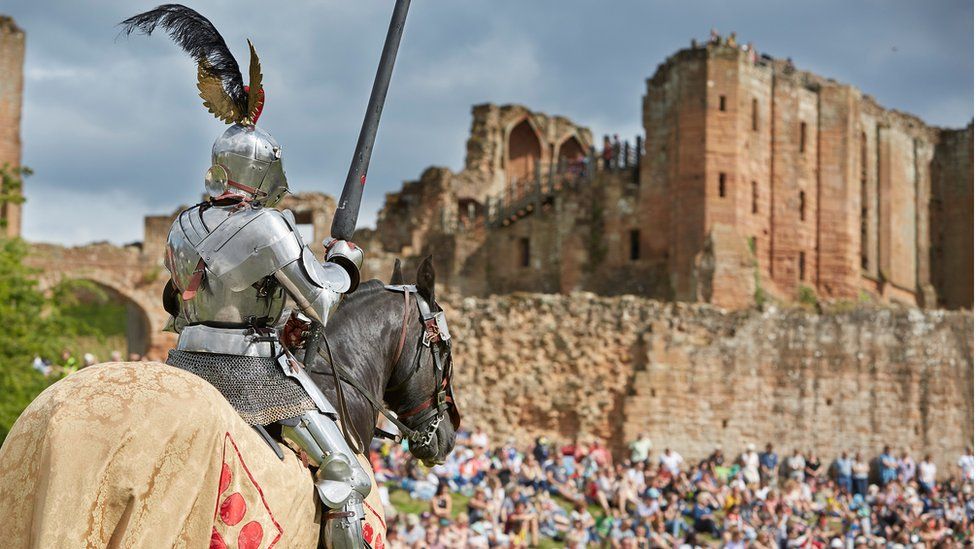Olympics: Include jousting in Games, petition urges
- Published

A petition calling for jousting to be made an Olympic sport has been launched by English Heritage.
The charity's jousting expert Dominic Sewell told BBC's Radio 5 live that the medieval pursuit was a "worldwide phenomenon that should be recognised".
Only about 20 people in the UK joust competitively, but the charity said tournaments were held across the world.
The International Olympic Committee (IOC) said it was "unaware" of any official request for its recognition.
Olympic bid
For a sport to be included in the Olympic Games programme, it must be governed by an international federation, practised widely across the world, and meet other various criteria before being considered by the IOC's executive board.
English Heritage said it had made an initial approach to the IOC and the Federation Equestre Internationale (FEI) - which governs all Olympic equestrian disciplines - as a first step on jousting's road to the Olympics.
Jousting would need to be recognised by the FEI before it could be considered as an Olympic sport by the IOC, English Heritage said.
English Heritage says jousting should be made an Olympic sport
Mr Sewell, who jousts competitively, said: "Just like the Olympic British equestrian team, we ride beautiful horses to an exceptional level."
He said jousting required a "huge amount of skill and a daily training regime", adding one had to be "strong, not just physically but mentally, so you can sit fearlessly in your saddle, face your rival, and offer yourself as a target".
Not just a hobby
Mr Sewell, a former furniture assembler in a factory, said: "This has gone from being a hobby to being a sport and a career."
He told BBC Radio 4's Today programme his interest had originally been fuelled by visiting historical re-enactments, but added: "I'm a sportsman, I'm not an actor."
Mr Sewell went on: "As soon as I got on a horse everything changed and I thought 'this is what I want to do, I want to be good at this'."
English Heritage admitted it could be a "long road" to get jousting recognised as an Olympic sport, but said there were "encouraging signs".
Tournaments were growing in popularity, the charity said, and were now held in countries such as Belgium, Brazil and New Zealand.
In the US, where jousting has been the official state sport of Maryland since 1962, competitors have launched a similar Olympic campaign.
Jousting: The rules
Jousting today is "quite a safe sport to take part in", Mr Sewell says.
"The rules are essentially that you are in a single combat situation, in a designated area, in a pitch - or 'tilt-yard' - and in that yard is a tilt rail."
The competitors charge down the rail towards each other with points awarded on the style and strength of their hit.
Wearing a suit of armour weighing around 20kg, the athletes hold a 12ft lance in one hand and their horse's reins in the other, all while riding towards their opponents at a flat-out gallop - at speeds of up to 30mph.
"These days injuries are few and far between... but the odd un-horsing might result in a few bruises," Mr Sewell says.
The IOC said its programme was currently being addressed as part of the Olympic Agenda 2020, the group's strategy for the future of the Olympics.
A spokesman said: "One recommendation was to make the Olympic programme more flexible by moving from a sport-based to an event-based programme."
Earlier this month, the IOC supported a bid to add karate, skateboarding, sports climbing, surfing and baseball/softball to the programme for Tokyo 2020.
If approved, the inclusion would add 18 events and 474 athletes to the Olympic Games.
King killed
Jousting, with its roots in Ancient Greece, where it was practised as part of preparations for war, emerged in England in the 10th Century as a sport for knights to hone their equine and lance skills.
The first jousting tournament in England is said to have been arranged by the Frenchman Godfrey de Preuilly in 1066.
The tournaments became so popular that in the 12th Century, King Henry II banned the sport, as he considered it too dangerous to have a number of highly skilled knights in the same place at the same time.
The ban was lifted under King Richard I and the sport remained popular, particularly during the Tudor era, until declining after the French King Henry II was killed during a joust in 1559.
Jousting enjoyed a revival under 19th Century romanticism, with writers such Lord Byron, Percy Shelley and Sir Walter Scott glamorising notions of chivalry with tales of knights and fair maidens.
- Published16 July 2016
- Published8 December 2014